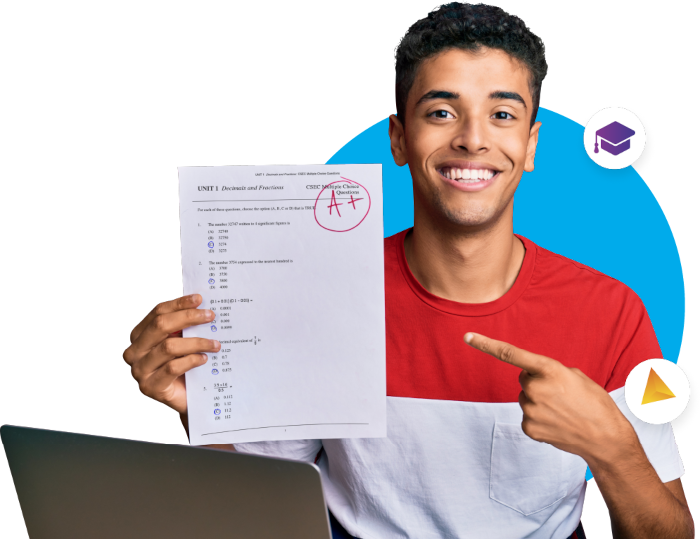Our premium, interactive, 1-on-1, academic math tutoring will equip your teen to turn their Algebra 2 struggles into As and confidence.
Apply Now
Our premium, interactive, 1-on-1 academic math tutoring will equip your teen to turn their Algebra 2 struggles into As and confidence.
Apply Now

Algebra 2 is the most challenging math class.
Why? You could think of Algebra 2 as Algebra 1 “on steroids”.Algebra 2, for the first time ever, your child is covering word problems and applications extensively. In addition to that, they’re learning inverse concepts and multiple types of functions and equations (logarithmic, exponential, rational, radical, polynomial).
Algebra 1 was all about the foundations. Algebra 2 puts all of these foundations into practice and adds a layer of context and applications to many topics. Hence, to succeed in Algebra 2 it’s not enough to simply solve equations. Your teen needs to recognize the contexts and the appropriate methods to use.
And they need to use them correctly and efficiently. At the previous levels, your teen dealt with 2-variable equations and concepts. In Algebra 2, they are dealing with equations and concepts with multiple variables (3 or more), most notably compound interest and logarithms.
Apply Now

Algebra 2 is the most challenging math class.
Why? You could think of Algebra 2 as Algebra 1 “on steroids”.Algebra 2, for the first time ever, your child is covering word problems and applications extensively. In addition to that, they’re learning inverse concepts and multiple types of functions and equations (logarithmic, exponential, rational, radical, polynomial).
Algebra 1 was all about the foundations. Algebra 2 puts all of these foundations into practice and adds a layer of context and applications to many topics. Hence, to succeed in Algebra 2 it’s not enough to simply solve equations. Your teen needs to recognize the contexts and the appropriate methods to use.
And they need to use them correctly and efficiently. At the previous levels, your teen dealt with 2-variable equations and concepts. In Algebra 2, they are dealing with equations and concepts with multiple variables (3 or more), most notably compound interest and logarithms.
Apply Now

This level of analytical thinking, inverse thinking and contextual analysis is challenging for many students.
There’s another issue with Algebra 2 that most people don’t realize. Your child has taken Algebra 1. They learned most of the foundations they are using in Algebra 2.
But that was before Geometry, 1.5 years ago. Geometry, however, is a big side-step. Geometry is much more visual, more based on diagrams and relationships between sides and angles than on Algebra. It primarily deals with triangles, proportionality and many different geometric setups.
For the most part, it doesn’t require advanced Algebra knowledge and it certainly doesn’t develop it. Algebra 2 is completely different! It’s a step back into the deep analytical aspect of math. And if your child is to thrive in this class, they are absolutely required to be fluent in all foundations of Algebra 1 (and beyond) - which many students have already forgotten by the time their Algebra 2 class starts.
Apply Now
But that was before Geometry, 1.5 years ago. Geometry, however, is a big side-step. Geometry is much more visual, more based on diagrams and relationships between sides and angles than on Algebra. It primarily deals with triangles, proportionality and many different geometric setups.
For the most part, it doesn’t require advanced Algebra knowledge and it certainly doesn’t develop it. Algebra 2 is completely different! It’s a step back into the deep analytical aspect of math. And if your child is to thrive in this class, they are absolutely required to be fluent in all foundations of Algebra 1 (and beyond) - which many students have already forgotten by the time their Algebra 2 class starts.
Apply Now


This level of analytical thinking, inverse thinking and contextual analysis is challenging for many students.
There’s another issue with Algebra 2 that most people don’t realize. Your child has taken Algebra 1. They learned most of the foundations they are using in Algebra 2.
But that was before Geometry, 1.5 years ago. Geometry, however, is a big side-step. Geometry is much more visual, more based on diagrams and relationships between sides and angles than on Algebra. It primarily deals with triangles, proportionality and many different geometric setups.
For the most part, it doesn’t require advanced Algebra knowledge and it certainly doesn’t develop it. Algebra 2 is completely different! It’s a step back into the deep analytical aspect of math. And if your child is to thrive in this class, they are absolutely required to be fluent in all foundations of Algebra 1 (and beyond) - which many students have already forgotten by the time their Algebra 2 class starts.
Apply Now
But that was before Geometry, 1.5 years ago. Geometry, however, is a big side-step. Geometry is much more visual, more based on diagrams and relationships between sides and angles than on Algebra. It primarily deals with triangles, proportionality and many different geometric setups.
For the most part, it doesn’t require advanced Algebra knowledge and it certainly doesn’t develop it. Algebra 2 is completely different! It’s a step back into the deep analytical aspect of math. And if your child is to thrive in this class, they are absolutely required to be fluent in all foundations of Algebra 1 (and beyond) - which many students have already forgotten by the time their Algebra 2 class starts.
Apply Now
Algebra 2 Challenges
We Will Help Your Teen Overcome.
Algebra 2 Challenges
We Will Help Your Teen Overcome.
Low retention of Algebra 1 concepts
Your child has taken Algebra 1 more than 12 months ago. Many students have difficulty retaining details of the material covered 5-6 months before (that's why the finals are difficult). As you might expect, by the time Algebra 2 rolls around, your child may not remember much of Algebra 1.Hence, many students need an extensive review. Algebra 2 includes all Algebra 1 foundations but with additional context, advanced concepts, methods and steps so struggling with Algebra 1 really holds a lot of students back.
Big homework-test gap
Many students feel that they understand the concepts when they are explained in class and are able to solve a lot (or all) homework problems. Yet, they struggle on tests.Some students are able to score 100% on homework and still fail tests.
How is that possible?
The problems on the tests tend to be more complicated, with extra steps, different wording or different twists.
Apply Now


Low retention of Algebra 1 concepts
Your child has taken Algebra 1 more than 12 months ago. Many students have difficulty retaining details of the material covered 5-6 months before (that's why the finals are difficult). As you might expect, by the time Algebra 2 rolls around, your child may not remember much of Algebra 1.Hence, many students need an extensive review. Algebra 2 includes all Algebra 1 foundations but with additional context, advanced concepts, methods and steps so struggling with Algebra 1 really holds a lot of students back.
Big homework-test gap
Many students feel that they understand the concepts when they are explained in class and are able to solve a lot (or all) homework problems. Yet, they struggle on tests.Some students are able to score 100% on homework and still fail tests.
How is that possible?
The problems on the tests tend to be more complicated, with extra steps, different wording or different twists.
Apply Now

Not enough covered in class
In your child’s class, the teacher likely shows 3-5 problems and hands out homework. I can say that with certainty because we see this over and over, with vast majority of students we talk to. It's prevalent.Showing 3-5 problems is not nearly enough.
Every topic in Algebra 2 has from 3 to 7 problem types. For every problem type, your child will have to deal with several different cases.
Hence, it’s pretty clear that your child’s teacher isn’t teaching nearly enough for your child to understand all of the problem types.
And yes, of course, your child should do homework and practice on their own. But they can’t do that without first having a solid fundamental understanding of the new material.
Passive learning
In class, in most cases, students don’t solve problems. They simply copy the solutions from the white board or fill out the notes sheet.That's called passive learning. And passive learning doesn't work. Instead of watching the teacher solve problems, reading the textbook or watching videos online, your child needs to actively analyze and solve problems.
Apply Now

Not enough covered in class
In your child’s class, the teacher likely shows 3-5 problems and hands out homework. I can say that with certainty because we see this over and over, with vast majority of students we talk to. It's prevalent.Showing 3-5 problems is not nearly enough.
Every topic in Algebra 2 has from 3 to 7 problem types. For every problem type, your child will have to deal with several different cases.
Hence, it’s pretty clear that your child’s teacher isn’t teaching nearly enough for your child to understand all of the problem types.
And yes, of course, your child should do homework and practice on their own. But they can’t do that without first having a solid fundamental understanding of the new material.
Passive learning
In class, in most cases, students don’t solve problems. They simply copy the solutions from the white board or fill out the notes sheet.That's called passive learning. And passive learning doesn't work. Instead of watching the teacher solve problems, reading the textbook or watching videos online, your child needs to actively analyze and solve problems.
Apply Now
Lack of individualized attention
The teachers sometimes aren’t able to answer questions. Sometimes they don’t want to. But even if they do, it’s very difficult with 20-30 students in the class. And since questions are the building blocks of learning, your child misses out on a lot of progress. To reach their full potential, they should learn at their own pace, ask questions about what's confusing to them, focus on the problems types they need to work on and learn in accordance with their learning preferences.Homework doesn't help
Many parents don’t know this but teachers often check the homework for completion, not correctness...Which means that your child gets 100% as long as they did the problems, regardless of whether they solved them correctly or not.
Yes, that explains why many students get 100% as their homework grade and still do poorly on tests.
Apply Now


Lack of individualized attention
The teachers sometimes aren’t able to answer questions. Sometimes they don’t want to. But even if they do, it’s very difficult with 20-30 students in the class. And since questions are the building blocks of learning, your child misses out on a lot of progress. To reach their full potential, they should learn at their own pace, ask questions about what's confusing to them, focus on the problems types they need to work on and learn in accordance with their learning preferences.Homework doesn't help
Many parents don’t know this but teachers often check the homework for completion, not correctness...Which means that your child gets 100% as long as they did the problems, regardless of whether they solved them correctly or not.
Yes, that explains why many students get 100% as their homework grade and still do poorly on tests.
Apply Now
Concepts covered
in Algebra 2
- Complex numbers
- Polynomial functions
- Rational exponents
- logarithms
- functions (exponential, logarithmic, rational, radical, absolute value and more)
- Transformations of functions
- Trigonometry
- Modeling
These concepts are covered in different order depending on the school, class and even specific teacher.
The depth and difficulty level also depends on variety of factors. That’s why we always customize the approach to every student’s individual needs.

We develop a personalized learning plan to fit your child's math class and goals.
Apply Now
Apply Now

Concepts covered
in Algebra 2
- Complex numbers
- Polynomial functions
- Rational exponents
- logarithms
- functions (exponential, logarithmic, rational, radical, absolute value and more)
- Transformations of functions
- Trigonometry
- Modeling
These concepts are covered in different order depending on the school, class and even specific teacher.
The depth and difficulty level also depends on variety of factors. That’s why we always customize the approach to every student’s individual needs.
We develop a personalized learning plan to fit your child's math class and goals.
Apply Now
Apply Now
Challenges students
experience on tests
“We didn’t do this in class.”
Sometimes the class runs short on time, there’s a sub or the teacher focuses on one of the problems, and there isn’t enough time to cover everything.When that happens, students often find themselves having to figure out the concepts, even the hardest ones, on their own.
“I kind of understand this problem but the wording throws me off.”
Teachers don’t cover many problems in class. As we mentioned, they usually show around 4-6 problems. Then, your child receives cookie-cutter homework.That creates a problem: during tests, students often encounter what we call "variations".
"Variations" are problems that often resemble the examples solved in class or in the homework but are different enough to be confusing. And students aren't sure how to approach them.
“These problems are way harder than homework.” Often times, the problems covered in class are easy to intermediate. There isn’t enough time to cover the hardest problems. But if your child is aiming for an A (or even a high B), they need to be able to solve all problems that show up on tests, especially the most challenging ones.
Challenges students
experience on tests
“We didn’t do this in class.”
Sometimes the class runs short on time, there’s a sub or the teacher focuses on one of the problems, and there isn’t enough time to cover everything.When that happens, students often find themselves having to figure out the concepts, even the hardest ones, on their own.
“I kind of understand this problem but the wording throws me off.”
Teachers don’t cover many problems in class. As we mentioned, they usually show around 4-6 problems. Then, your child receives cookie-cutter homework.That creates a problem: during tests, students often encounter what we call "variations".
"Variations" are problems that often resemble the examples solved in class or in the homework but are different enough to be confusing. And students aren't sure how to approach them.
“These problems are way harder than homework.” Often times, the problems covered in class are easy to intermediate. There isn’t enough time to cover the hardest problems. But if your child is aiming for an A (or even a high B), they need to be able to solve all problems that show up on tests, especially the most challenging ones.

Equip Your Teen To Excel In Algebra 2 With Our Professional, Interactive, 1-on-1 Academic Math Tutoring.

